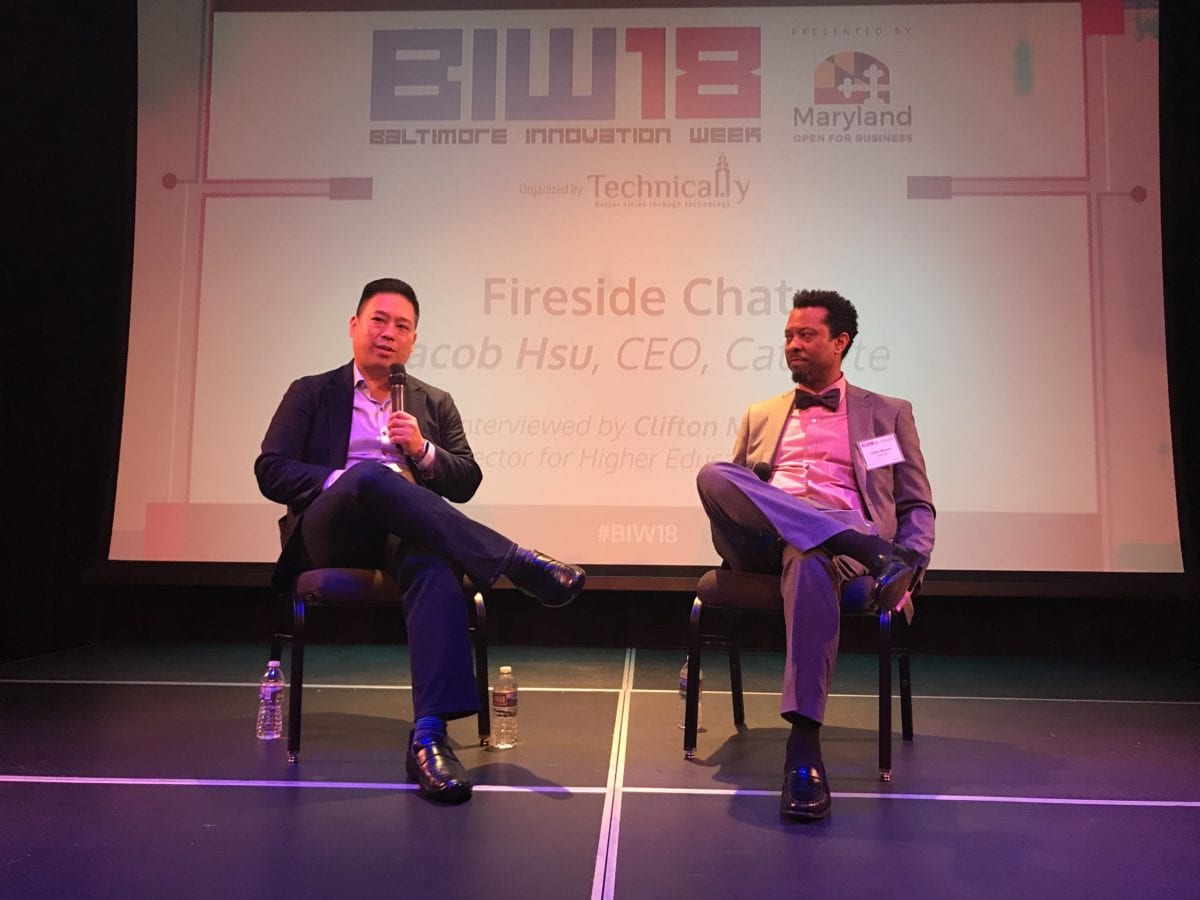Jacob Hsu was planning to leave Silicon Valley, and move to Sweden. Then he got introduced to Catalyte.
When he learned about the company (then called Catalyst DevWorks) and its platform that seeks to eliminate bias in hiring and expand opportunity to software developers from all backgrounds, he quickly decided to move to Baltimore instead and become CEO of the company.
Earlier this year, the Otterbein-based company announced plans to expand software development centers from two to 20 in cities across the U.S., and Hsu told former president Barack Obama about Baltimore’s tech talent.
During a fireside chat with Year Up Baltimore Site Director for Higher Education Programs Clifton Morgan at Wednesday’s Hire Bmore: Developing a People Pipeline, Hsu offered thoughts on hiring, software and how the company is looking to address the adage that “talent and ability is evenly distributed and opportunity is not.” Organized by Technical.ly, the event was part of Baltimore Innovation Week 2018.
https://twitter.com/Catalyte_io/status/1050384923654311936
Here are a few takeaways from the conversation:
On software…
Mobile software created a fundamental change in how software was made, Hsu said. With everyone using products and developing a sense of good and bad software, companies were required to build with the user in mind.
On how Catalyte hires…
“I don’t know what my workforce looks like until they show up,” Hsu said. The company uses software to hire software developers teams that work inside big companies. It offers an assessment to prospective hires, who can be from any industry. The company’s platform that uses AI to look at whether a person has the aptitude to become a great software engineer. “We’re fundamentally looking for people who are great problem solvers,” he said. The approach doesn’t take into account resumes, educational background, relationships or other traditional hiring elements that notoriously cause bias. “Our ultimate goal is we want to kill the resume. We believe that anybody from any background can do these jobs,” he said. As a result, he said, “You actually end up with a workforce that looks like the community that you hire from,” he said.
On training…
When developers are hired, they go through a training program that Hsu said is just as important as the platform. The developers move through the program as a class. Along with the ins and outs of coding, the group approach means the training focuses on how the developers will engage with clients. They then apprentice for two years, and learn many different languages. “Most people coming out of apprenticeships are really strong in 5-6 different tech stacks,” he said, and they’re constantly being exposed to new things. Since software development is changing quickly, that ability to adapt is key.
On going local…
Along with seeking to reflect the communities where they work, Hsu said there’s value in providing local teams to work at local companies. He calls it “farm to table software development.” Local teams create better experiences, as well as higher productivity and efficiency, he said.
On culture…
Instead of implementing a strict hierarchy, the company encourages employees to help and encourage each other, and form mentoring relationships. They form bonds, he said. Going through the training program and then working on teams with people from a variety of backgrounds also opens up new relationships, Hsu said. “Suddenly you’ve created a whole new professional network for yourself,” he said. As a result, alums tend to stay in touch.
5 takeaways on the future of tech hiring from Catalyte CEO Jacob Hsu







